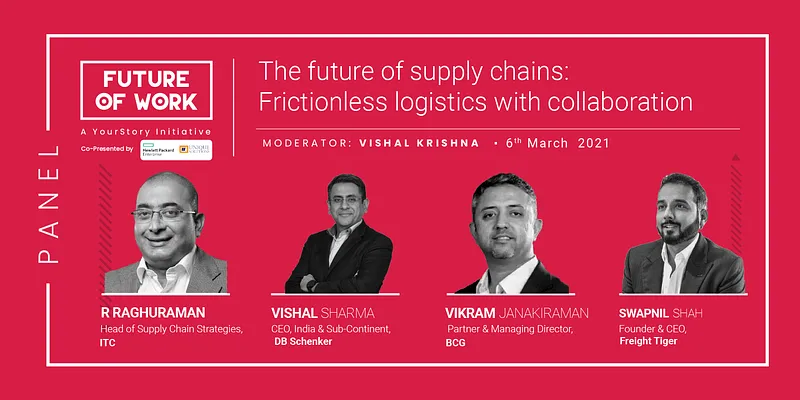Future of Work: The future of supply chains depends on frictionless logistics with collaboration
At Future of Work 2021, a panel of logistics experts described how India's supply chains are unorganised, and how high friction in the market can be solved through seamless integration among logistics stakeholders.
Coming together at Future of Work 2021, a panel of logistics experts discussing the future of supply chains concurred that data-driven technology adoption and seamless integration among myriad logistics stakeholders can solve the problem of India's fragmented supply chains.
The panel comprised R Raghuraman, Head of Supply Chain Strategies, ITC; Vishal Sharma, CEO, India and Sub-Continent, DB Schenker; Vikram Janakiraman, Partner and Managing Director, BCG; and Swapnil Shah, Founder and CEO, .

According to BCG's Vikram Janakiraman, India's supply chains are unorganised, and the network problem leads to high friction in the market, such as trucks running empty or sitting idle.
"These are inefficiencies which cost the economy big time. To fix this, we need common platforms that leverage data to integrate logistics participants and drive information and transparency. Getting to Logistics 4.0 will be a completely data-led transformation," he said.
DB Schenker's Vishal Sharma, corroborating this view, said business across India are looking for seamless integrations with other companies and customers. "In terms of logistics, they realise they cannot do everything in-house or outsource everything. They need a hybrid model to utilise supply chains in a holistic manner," he said, adding:
"The thought is to build more resiliency in supply chains and not leave things to chance. Perhaps stress testing of supply chains in various scenarios was not enough in the previous era of rapid expansion."
The panellists touched upon several key trends in the Indian logistics space, including a rise in digital-savvy businesses, adoption of end-to-end automation, adoption of high-end technology for quick decision making and route optimisation, and more.
Freight Tiger's Swapnil Shah cautioned software and logistics solution builders that without on-ground experience and an existing ecosystem and network of stakeholders, the software doesn't have much value. "Only technology can lead the way when the problem is large, but there needs to be trust and inclusion among stakeholders at all levels, right from managers to truckers," he said.
Dubbing the new, data-driven roles of these stakeholders like that of "logisticians," ITC's Raghuraman said data-driven logistics solutions can help expand the boundaries of a business' operating zone.
"By doing so, you can analyse and remove inefficiencies, anticipate problems in advance, and prevent them before they happen."
With the Indian logistics market expected to grow at a CAGR of 10.7 percent between 2020-2024, businesses and brands only stand to boost growth by leveraging cutting-edge technologies. Moving forward in 2021, several trends will drive growth, and all will involve the adoption of technology.
A big shout out to our Future of Work 2021 Co-presenting Sponsors Hewlett Packard Enterprise and Unique Solutions; Digital Excellence Partner, Google Cloud; Associate Sponsor HP and Intel; and Sponsors: Atlassian, Freight Tiger, Archon I Cohesity, TeamViewer, and Pocket Aces

Edited by Suman Singh








